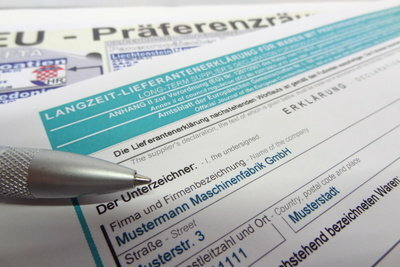Apply for a Eur.1 certificate for international shipping
Would you like to send goods to a third country? Then you must check whether the goods are preferential and whether you can issue a Eur.1 certificate. In the best case scenario, this means that the recipient can ensure that the shipment is completely exempt from customs duties.

What you need:
- Submission of a Eur.1 certificate
For this you need the Eur.1 form
- The Eur.1 certificate is a movement certificate and thus a kind of certificate of origin that proves the origin of a product.
- However, the Eur.1 certificate is only required for international goods traffic.
- The purpose of this certificate is that the recipient for preferential goods, which through a Eur.1 certificate is documented as such, a preferential tariff or, depending on the country of destination, even complete duty-free status can cause.
- However, as already mentioned, a condition for fulfilling the provisions of this movement certificate is the preferential treatment of a goods. No Eur.1 certificate may be issued for non-preferential goods.
- In order to determine whether a product that is to be sent to a third country has preferential treatment, the same is subjected to an examination. Above all, the origin of the goods to be shipped is checked. However, there are different conditions for fulfillment for each individual product, depending on the customs or tariff number of the respective product. If the preferential treatment turns out to be positive, a Eur.1 form can be requested.
Shipping goods to Canada - you need to take this into account
Would you like to send goods to Canada? Then you should definitely do a few things ...
Application for the certificate at customs
- First you have to prove that your goods have preferential treatment, i.e. that the conditions are met. For goods from France, for example, you need a so-called supplier declaration from Your supplier, who hereby confirms that the goods are actually made in France became. Please note, however, that the supplier may invoice you for the declaration, even if such a supplier declaration is usually free of charge.
- A Eur.1 form is issued by the customs office. To do this, apply for a corresponding template at your customs office, which you now have to fill out.
- To fill out the template, you will need, among other things, the full address of the recipient of the goods as well as the country of destination, the country of origin of the goods, the gross weight, the value of the goods and the mode of transport. Write the information in the fields provided.
- If all information is entered correctly and checked again, return the certificate signed by the issuer to the relevant customs office. This checks your issued certificate and then approves it.
How helpful do you find this article?

